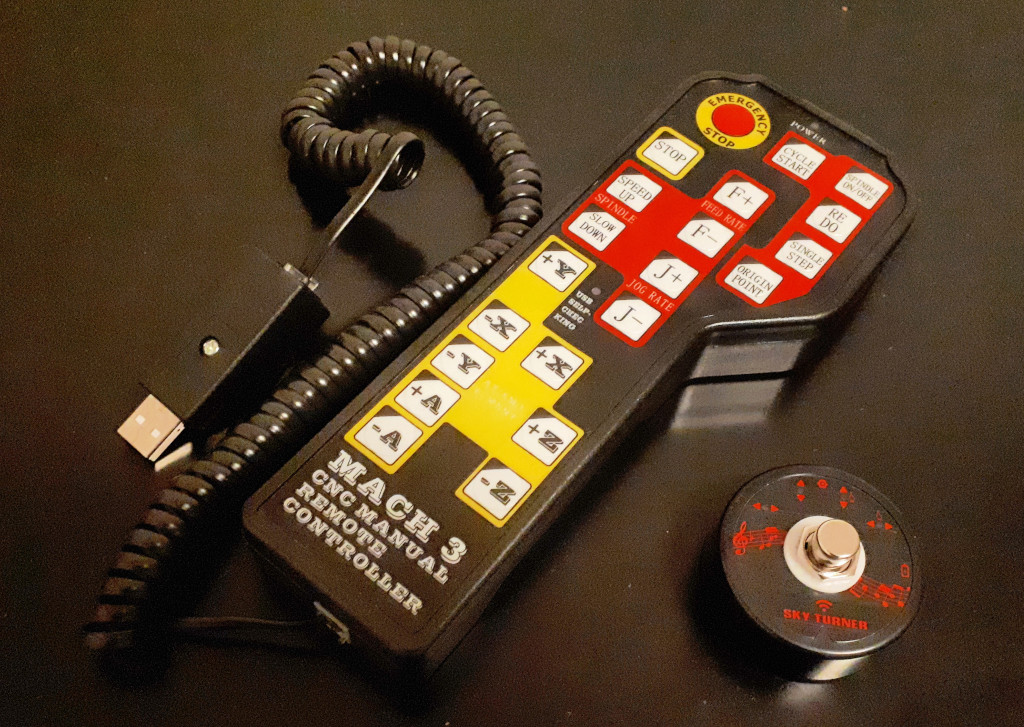
I acquired some unusual input devices to experiment with, like a CNC control panel and a bluetooth pedal page turner.
These identify and behave like a keyboard, sending nice and simple keystrokes, and can be accessed with no drivers or other special software. However, their keystrokes appear together with keystrokes from normal keyboards, which is the expected default when plugging in a keyboard, but not what I want in this case.
I'd also like them to be readable via evdev and accessible by my own user.
Here's the udev rule I cooked up to handle this use case:
# Handle the CNC control panel
SUBSYSTEM=="input", ENV{ID_VENDOR}=="04d9", ENV{ID_MODEL}=="1203", \
OWNER="enrico", ENV{ID_INPUT}=""
# Handle the Bluetooth page turner
SUBSYSTEM=="input", ENV{ID_BUS}=="bluetooth", ENV{LIBINPUT_DEVICE_GROUP}=="*/…mac…", ENV{ID_INPUT_KEYBOARD}="1" \
OWNER="enrico", ENV{ID_INPUT}="", SYMLINK+="input/by-id/bluetooth-…mac…-kbd"
SUBSYSTEM=="input", ENV{ID_BUS}=="bluetooth", ENV{LIBINPUT_DEVICE_GROUP}=="*/…mac…", ENV{ID_INPUT_TABLET}="1" \
OWNER="enrico", ENV{ID_INPUT}="", SYMLINK+="input/by-id/bluetooth-…mac…-tablet"
The bluetooth device didn't have standard rules to create /dev/input/by-id/
symlinks so I added them. In my own code, I watch /dev/input/by-id with
inotify to handle when devices appear or disappear.
I used udevadm info /dev/input/event… to see what I could use to identify the
device.
The Static device configuration via udev page of libinput's documentation has documentation on the various elements specific to the input subsystem
Grepping rule files in /usr/lib/udev/rules.d was useful to see syntax
examples.
udevadm test /dev/input/event… was invaluable for syntax checking and testing
my rule file while working on it.
Finally, this is an extract of a quick prototype Python code to read keys from the CNC control panel:
import libevdev
KEY_MAP = {
libevdev.EV_KEY.KEY_GRAVE: "EMERGENCY",
# InputEvent(EV_KEY, KEY_LEFTALT, 1)
libevdev.EV_KEY.KEY_R: "CYCLE START",
libevdev.EV_KEY.KEY_F5: "SPINDLE ON/OFF",
# InputEvent(EV_KEY, KEY_RIGHTCTRL, 1)
libevdev.EV_KEY.KEY_W: "REDO",
# InputEvent(EV_KEY, KEY_LEFTALT, 1)
libevdev.EV_KEY.KEY_N: "SINGLE STEP",
# InputEvent(EV_KEY, KEY_LEFTCTRL, 1)
libevdev.EV_KEY.KEY_O: "ORIGIN POINT",
libevdev.EV_KEY.KEY_ESC: "STOP",
libevdev.EV_KEY.KEY_KPPLUS: "SPEED UP",
libevdev.EV_KEY.KEY_KPMINUS: "SLOW DOWN",
libevdev.EV_KEY.KEY_F11: "F+",
libevdev.EV_KEY.KEY_F10: "F-",
libevdev.EV_KEY.KEY_RIGHTBRACE: "J+",
libevdev.EV_KEY.KEY_LEFTBRACE: "J-",
libevdev.EV_KEY.KEY_UP: "+Y",
libevdev.EV_KEY.KEY_DOWN: "-Y",
libevdev.EV_KEY.KEY_LEFT: "-X",
libevdev.EV_KEY.KEY_RIGHT: "+X",
libevdev.EV_KEY.KEY_KP7: "+A",
libevdev.EV_KEY.KEY_Q: "-A",
libevdev.EV_KEY.KEY_PAGEDOWN: "-Z",
libevdev.EV_KEY.KEY_PAGEUP: "+Z",
}
class KeyReader:
def __init__(self, path: str):
self.path = path
self.fd: IO[bytes] | None = None
self.device: libevdev.Device | None = None
def __enter__(self):
self.fd = open(self.path, "rb")
self.device = libevdev.Device(self.fd)
return self
def __exit__(self, exc_type, exc, tb):
self.device = None
self.fd.close()
self.fd = None
def events(self) -> Iterator[dict[str, Any]]:
for e in self.device.events():
if e.type == libevdev.EV_KEY:
if (val := KEY_MAP.get(e.code)):
yield {
"name": val,
"value": e.value,
"sec": e.sec,
"usec": e.usec,
}
Edited: added rules to handle the Bluetooth page turner